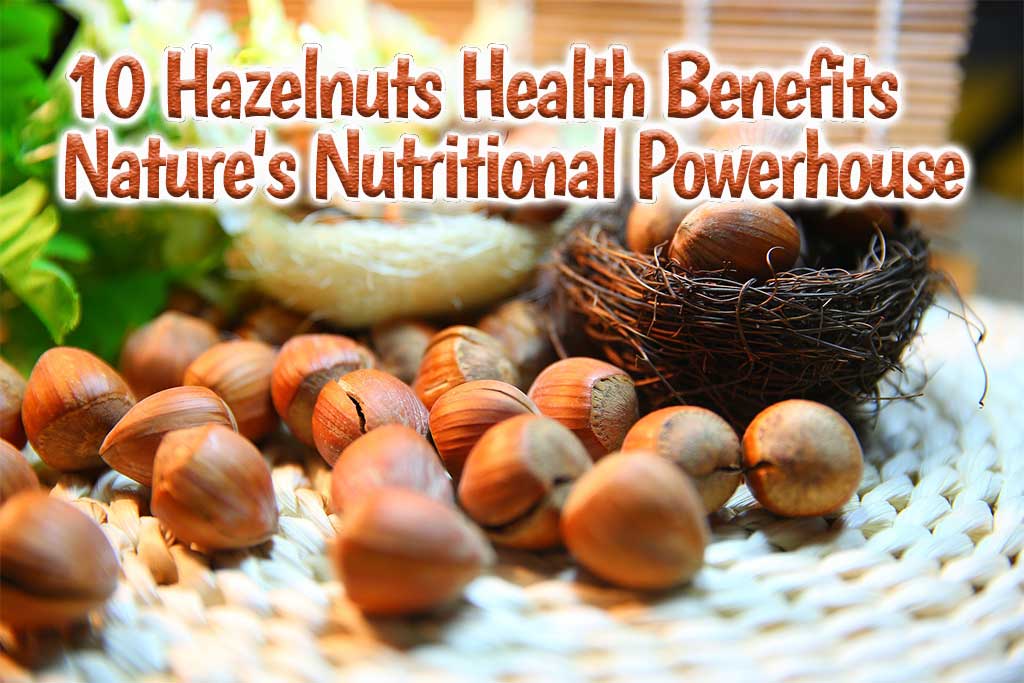10 Hazelnuts Health Benefits Nature’s Nutritional Powerhouse
Table of Contents:
1. Introduction
2. Hazelnuts: A Brief Overview
– Description
– Species
– Interesting Facts
3. The Health Benefits of Hazelnuts
– Benefit 1: Heart Health
– Benefit 2: Improved Brain Function
– Benefit 3: Weight Management
– Benefit 4: Boosted Immune System
– Benefit 5: Enhanced Digestive Health
– Benefit 6: Reduced Cancer Risk
– Benefit 7: Stronger Bones and Teeth
– Benefit 8: Antioxidant Protection
– Benefit 9: Improved Skin Health
– Benefit 10: Enhanced Nutrient Absorption
4. Incorporating Hazelnuts into Your Daily Diet
– Snacking on Whole Hazelnuts
– Adding Hazelnuts to Breakfast
– Using Hazelnut Butter in Recipes
– Incorporating Hazelnut Flour in Baking
– Blending Hazelnuts into Smoothies
– Hazelnuts in Salads and Savory Dishes
5. Hazelnut-Based Products You’ll Love
– Hazelnut Spread
– Hazelnut Milk
– Hazelnut Oil
– Hazelnut Flour
– Hazelnut Coffee
6. Nutritional Value of Hazelnuts per 100 grams
– Calories
– Carbohydrates
– Fats
– Protein
– Vitamin E
– Calcium
– Iron
– Fiber
7. Embracing the Versatility and Health Benefits of Hazelnuts
8. Hazelnuts side effects
9. FAQ Section
1. Introduction
Hazelnuts, also known as filberts, are delicious and nutrient-dense nuts that have gained popularity in recent years due to their exceptional health benefits. Packed with essential nutrients and a rich, buttery flavor, hazelnuts offer numerous advantages when incorporated into a balanced diet. In this comprehensive guide, we will explore the wonders of hazelnuts, from their description and species to their remarkable health benefits, various culinary uses, nutritional value, and popular hazelnut-based products.
2. Hazelnuts: A Brief Overview

Description:
Hazelnuts are small, round nuts enclosed in a hard, brown shell that is often cracked open to access the kernel within. These kernels are cream-colored, with a distinctive mild and nutty taste. Hazelnuts are typically harvested in autumn and are widely cultivated in regions such as Turkey, Italy, and the United States.
Species:
The most common species of hazelnuts are the European hazelnut (Corylus avellana) and the American hazelnut (Corylus americana). The European variety is the most widely consumed, known for its larger size and sweeter flavor, while the American hazelnut is smaller and has a slightly more robust taste.
Interesting Facts:
– Hazelnuts have a rich history, dating back to ancient times. They were even mentioned in the Bible and have been cultivated for over 5,000 years.
– Turkey is the largest producer of hazelnuts, accounting for approximately 75% of the global supply.
– Hazelnuts are a key ingredient in popular treats like pralines, Nutella, and many traditional desserts.
– These nuts are highly versatile and can be enjoyed raw, roasted, ground, or used in various culinary creations.
3. The Health Benefits of Hazelnuts

Benefit 1: Heart Health
Hazelnuts are heart-friendly nuts that can help lower the risk of cardiovascular diseases. They are rich in monounsaturated fats, which have been linked to reducing LDL (bad) cholesterol levels while increasing HDL (good) cholesterol levels. Additionally, hazelnuts contain a compound called arginine, which promotes blood vessel health and reduces the risk of blood clot formation. By supporting heart health, hazelnuts indirectly contribute to kidney health as the kidneys rely on a healthy circulatory system to function optimally.
Benefit 2: Improved Brain Function
The vitamin E content in hazelnuts contributes to improved cognitive function and protects against age-related cognitive decline. Vitamin E acts as a powerful antioxidant, safeguarding the brain cells from damage caused by free radicals.
Benefit 3: Weight Management
Despite their relatively high-calorie content, hazelnuts can be beneficial for weight management. The combination of fiber, protein, and healthy fats in hazelnuts helps increase satiety, reducing the likelihood of overeating and aiding in weight control.
Benefit 4: Boosted Immune System
Hazelnuts contain essential nutrients like vitamin C, which plays a crucial role in strengthening the immune system. The antioxidant properties of hazelnuts also help protect the body against oxidative stress, reducing inflammation and supporting overall immune function.
Benefit 5: Enhanced Digestive Health
The dietary fiber found in hazelnuts promotes healthy digestion by preventing constipation and maintaining regular bowel movements. Hazelnuts are also a good source of prebiotics, which nourish beneficial gut bacteria and contribute to a healthy gut microbiome.
Benefit 6: Reduced Cancer Risk
Hazelnuts are packed with antioxidants and phytochemicals that help combat oxidative stress and inflammation, both of which are associated with an increased risk of cancer. Regular consumption of hazelnuts has been linked to a decreased risk of colon, breast, and lung cancers.
Benefit 7: Stronger Bones and Teeth
Hazelnuts are rich in minerals such as calcium, magnesium, and phosphorus, which are essential for maintaining healthy bones and teeth. These minerals work together to support bone density and reduce the risk of conditions like osteoporosis.
Benefit 8: Antioxidant Protection
The abundance of antioxidants in hazelnuts, including vitamin E and flavonoids, helps protect the body’s cells from oxidative damage caused by free radicals. This protection contributes to a lower risk of chronic diseases, including heart disease and certain types of cancer. These antioxidants help protect the kidneys from oxidative stress, which is known to contribute to kidney damage. By neutralizing harmful free radicals, hazelnuts can help maintain the health of kidney tissues.
Benefit 9: Improved Skin Health
The vitamin E content in hazelnuts provides excellent benefits for the skin. Vitamin E is known for its ability to moisturize the skin, reduce inflammation, and promote a youthful appearance. Regular consumption of hazelnuts may help improve skin elasticity and reduce the signs of aging.
Benefit 10: Enhanced Nutrient Absorption
The healthy fats found in hazelnuts play a crucial role in the absorption of fat-soluble vitamins, such as vitamin A, D, E, and K. Including hazelnuts in your diet can maximize the bioavailability of these essential vitamins, ensuring your body receives their full benefits.
It is important to note that while hazelnuts offer potential benefits for kidney health, they should be consumed as part of a balanced diet. If you have an existing kidney condition or specific dietary restrictions, it is recommended to consult with a healthcare professional or registered dietitian for personalized advice.
4. Incorporating Hazelnuts into Your Daily Diet
Snacking on Whole Hazelnuts:
Enjoy hazelnuts as a healthy and satisfying snack on their own or combined with other nuts and dried fruits. A handful of hazelnuts can provide a quick energy boost and keep you feeling full between meals.
Adding Hazelnuts to Breakfast:
Sprinkle chopped hazelnuts over your morning oatmeal, cereal, or yogurt for added crunch and flavor. You can also blend hazelnuts into smoothies or incorporate hazelnut milk into your coffee or tea.
Using Hazelnut Butter in Recipes:
Swap your regular peanut butter for creamy hazelnut butter to spread on toast, mix into baked goods, or add to sauces and dressings. Hazelnut butter offers a unique and indulgent taste that elevates any dish.
Incorporating Hazelnut Flour in Baking:
For a gluten-free alternative, replace a portion of regular flour with hazelnut flour in your baking recipes. Hazelnut flour adds a rich and nutty flavor while providing a moist texture to cakes, cookies, and bread.
Blending Hazelnuts into Smoothies:
Upgrade your smoothies by blending hazelnuts into the mix. The combination of hazelnuts with fruits, greens, and a liquid base creates a nutritious and satisfying beverage.
Hazelnuts in Salads and Savory Dishes:
Add a delightful crunch to your salads by tossing in toasted hazelnuts. You can also use crushed hazelnuts as a coating for fish or poultry, or incorporate them into stir-fries and vegetable dishes for extra texture and flavor.
5. Hazelnut-Based Products You’ll Love
Hazelnut Spread:
A popular hazelnut-based product is the beloved hazelnut spread. Perfect for spreading on bread, pancakes, or waffles, hazelnut spread provides a sweet and nutty taste that appeals to people of all ages.
Hazelnut Milk:
For those seeking a dairy-free alternative, hazelnut milk is a delicious choice. It can be enjoyed on its own, used in smoothies, or added to coffee and baked goods. Hazelnut milk offers a creamy texture and a subtle nutty flavor.
Hazelnut Oil:
Hazelnut oil is a flavorful and aromatic oil that is often used in salad dressings, marinades, and baking. Its distinct nutty taste adds a delightful twist to various dishes, enhancing their overall flavor profile.
Hazelnut Flour:
Hazelnut flour, made by finely grinding hazelnuts, is an excellent gluten-free option for baking. It imparts a rich, nutty taste and moist texture to baked goods while also providing a boost of nutrients.
Hazelnut Coffee:
Indulge in the enticing aroma and taste of hazelnut coffee. This flavored coffee combines the richness of coffee with the nutty sweetness of hazelnuts, creating a delightful beverage for coffee lovers.
Vegan Chocolate Hazelnut Cake Recipe

6. Nutritional Value of Hazelnuts per 100 grams
– Calories: 628
– Carbohydrates: 16 grams
– Fats: 61 grams
– Protein: 15 grams
– Vitamin E: 15 mg (79% of the Recommended Daily Intake)
– Calcium: 114 mg
– Iron: 4.7 mg
– Fiber: 9 grams
7. Embracing the Versatility and Health Benefits of Hazelnuts
Hazelnuts are more than just a tasty snack; they are a nutritional powerhouse. With their array of health benefits, including promoting heart health, improving brain function, and supporting weight management, hazelnuts are a valuable addition to any diet. From snacking on whole hazelnuts to incorporating hazelnut-based products in your favorite recipes, there are countless ways to enjoy the delicious flavors and reap the rewards of hazelnuts. So, whether you’re looking to boost your overall well-being or simply indulge in a delectable treat, hazelnuts are here to satisfy your cravings and nourish your body.
8. Hazelnuts side effects
While hazelnuts are generally safe to consume for most individuals, there are a few considerations and potential side effects to be aware of:
- Allergic Reactions: Hazelnuts belong to the tree nut family, and individuals with nut allergies may experience allergic reactions when consuming hazelnuts. Symptoms can range from mild to severe and may include itching, swelling, hives, difficulty breathing, or anaphylaxis. If you have a known nut allergy, it is crucial to avoid hazelnuts and hazelnut-based products.
- Gastrointestinal Issues: Hazelnuts are high in fiber, which is generally beneficial for digestion. However, for some individuals, consuming excessive amounts of fiber can lead to gastrointestinal discomfort, including bloating, gas, and diarrhea. It is important to consume hazelnuts in moderation and gradually increase your intake to allow your body to adjust to the fiber content.
- Weight Gain: While hazelnuts offer numerous health benefits, they are also energy-dense due to their relatively high calorie and fat content. Eating large quantities of hazelnuts without considering your overall calorie intake can contribute to weight gain. It is essential to enjoy hazelnuts in moderation as part of a balanced diet.
- Interference with Medications: Hazelnuts contain vitamin E, which acts as an anticoagulant, or blood-thinning agent. If you are taking medications that have similar effects, such as anticoagulants or antiplatelet drugs, consuming large amounts of hazelnuts may increase the risk of bleeding or interfere with the medication’s effectiveness. If you are on any medications, consult your healthcare provider for guidance on hazelnut consumption.
- Potential Oxalate Content: While hazelnuts are relatively low in oxalate compared to some other nuts, they still contain a moderate amount. Oxalate can contribute to the formation of kidney stones in susceptible individuals. If you have a history of kidney stones or are prone to developing them, it is advisable to monitor your overall oxalate intake and consult with a healthcare professional or registered dietitian for personalized guidance.
It’s important to note that these potential side effects are not experienced by everyone, and many individuals can enjoy hazelnuts without any adverse effects. If you have any concerns or specific health conditions, it is always best to consult with a healthcare professional or registered dietitian before making significant changes to your diet.
9. FAQ Section
Q1: Are hazelnuts suitable for individuals with nut allergies?
A1: Hazelnuts are tree nuts and can cause allergic reactions in individuals with nut allergies. It is essential to consult with an allergist or healthcare professional before consuming hazelnuts or hazelnut-based products if you have a known nut allergy.
Q2: How many hazelnuts should I eat per day to enjoy their health benefits?
A2: While there is no specific daily recommendation for hazelnut consumption, incorporating a handful (about 1 ounce or 28 grams) of hazelnuts into your daily diet can provide you with their beneficial nutrients and contribute to a balanced lifestyle.
Q3: Can hazelnuts help with weight loss?
A3: Although hazelnuts are relatively high in calories, their combination of healthy fats, protein, and fiber can promote feelings of fullness and help control appetite. Including hazelnuts as part of a well-rounded, calorie-controlled diet can support weight management goals.
Q4: Can hazelnuts be enjoyed by vegans and vegetarians?
A4: Yes, hazelnuts are suitable for both vegans and vegetarians. They are plant-based and provide a rich source of protein, healthy fats, and other essential nutrients that can be incorporated into vegan and vegetarian diets.
Q5: Can I substitute hazelnuts for other nuts in recipes?
A5: Yes, hazelnuts can often be substituted for other nuts in recipes, depending on your taste preferences and dietary needs. Keep in mind that hazelnuts have a distinct flavor, so the substitution may alter the final taste of the dish. Experimentation is key to finding the perfect nut substitution for your recipes.
Q6: How should hazelnuts be stored to maintain their freshness?
A6: To keep hazelnuts fresh and prevent them from becoming rancid, store them in an airtight container in a cool, dark place, such as a pantry or refrigerator. Proper storage can help preserve the flavor and texture of hazelnuts for an extended period.
Remember, if you have any specific concerns or dietary restrictions, it is advisable to consult with a healthcare professional or nutritionist for personalized advice and guidance regarding hazelnut consumption.
Disclaimer: The information provided in this article is for educational and informational purposes only. It is not intended as a substitute for professional medical advice, diagnosis, or treatment. Always seek the advice of your physician, registered dietitian, or other qualified healthcare provider with any questions you may have regarding a medical condition or dietary concerns.

